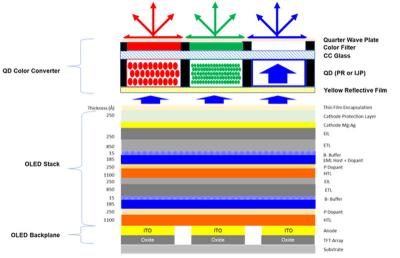The Verge: SDC's 15.6" laptop AMOLED display is tremendous, absolutely worth the extra cost
The Verge posted a review of one of the world's first 2019 OLED laptops, the HP 2019 Spectre x360 15. The reviewer loves the OLED display: "The Spectre x360 15’s display is tremendous, and I see no reason why someone would pick an LCD over this OLED, given the option. It’s absolutely worth the higher cost (Ed: around $400)."

HP's Spectre x360 15 features an Intel Core i7 CPU, 16 GB of RAM and 512 GB of SSD storage. The OLED display is a 15.6" 3840x2160 panel produced by SDC. HP's Spectre x360 15 laptops are now shipping, the OLED models start at $2,299.
DSCC: Samsung, Apple and Huawei are the world's top flexible AMOLED smartphone customers
DSCC published an interesting note, detailing the world's top 10 devices by flexible AMOLED sales in the first half of 2019. The list contains only three vendors: Samsung, Apple and Huawei.

Total flexible AMOLED revenues for these ten devices are almost $4.7 billion, and Samsung phones account for 53% ($2.5 billion). Apple has only 2 leading models, but accounts for 30% of the revenues ($1.4 billion) and Huawei phones generated $723 million in flexible AMOLED revenues.
Business Korea: Samsung to decide on its QD-OLED TV plans soon
Samsung has not committed yet to its QD-OLED TV technology, and according to a new report from Korea the company will make its final decision by the end of June (or early July). Samsung originally planned to hold an investment review committee on April 2019 but that did not materialize. According to an industry insider, Samsung already decided to start QD-OLED TV production, the only question is timing.

Samsung's plan is to shut down an LCD TV production line and convert it to QD-OLED production - although Business Korea now suggests that another possibility is to build a new production line instead of its planned A5 fab (which was delayed/canceled in early 2018).
Samsung is asking Apple to compensate it for not reaching its iPhone OLED agreed order quantities
According to a report from Korea, when Apple secured its flexible AMOLED supply from Samsung for the iPhone X (and later XS and XS Plus) it committed to a minimum order quantity. As sales of the iPhones were slower than expected, the company did not reach its MOQ, and is now facing penalties of hundreds of millions of dollars.

It seems as if Apple is reluctant to pay the penalty (which isn't a big surprise) and is offering some alternative routes for Samsung - including the option of ordering OLED displays for future iPads or laptops (this coincides with a report from Korea last month).
China-based JD.com: sales of the OnePlus 7 Pro in China are far surpassing Samsung's GS10+ sales
JD.com, a popular online retailer in China, says that sales of the OnePlus 7 Pro are more than ten times higher than the sales of Samsung's flagship Galaxy S10 Plus (which has a comparable display size). JD says that there were 250,372 OnePlus units sold - compared to only 23,266 GS10+ units.
 The OnePlus 7 Pro is the company's flagship smartphone that features a large 6.67" 90Hz 1440x3120 Fluid AMOLED (which is apparently a 90Hz Super AMOLED) full-screen display with an under-the-display fingerprint sensor. The GS10+ sports a 6.4" 60Hz 3040x1440 (522 PPI) Super AMOLED display.
The OnePlus 7 Pro is the company's flagship smartphone that features a large 6.67" 90Hz 1440x3120 Fluid AMOLED (which is apparently a 90Hz Super AMOLED) full-screen display with an under-the-display fingerprint sensor. The GS10+ sports a 6.4" 60Hz 3040x1440 (522 PPI) Super AMOLED display.
Reports from Korea suggest that Samsung still faces technology challenges before it can begin producing QD-OLED TVs
Samsung is developing its QD-OLED TV technology and the company was supposed to hold an investment review committee on April 2019 to decide whether to go ahead with plans to start production soon (mass production by the end of 2020).

However in May we later reported that Samsung decided to delay the production - trial production will begin towards the end of 2020, with real mass production on a new 10-Gen line only at around 2023. A new report from Korea sheds some more light on Samsung's situation.
UBI: OLED production capacity to double by 2023, Korean makers to retain their 80% market share by area
UBI Research estimates that OLED production capacity will increase from 34.9 million sqm to 68.5 million by 2023. LG Display and Samsung Display are expected to increase production of OLED TV and introduce new 10.5-Gen fabs better suited for 65" TV production.

Mobile OLED production capacity will also grow, but at a slower rate - from 13 million sqm in 2019 to 19.3 million sqm in 2023, mainly driven by Chinese OLED producers that produce flexible smartphone OLED displays mainly for the Chinese domestic market. Korean OLED producers (SDC and LGD) will continue to dominate the market and will retain their ~80% market share in 2023.
Gigabyte prices its AERO 15 OLED laptop, will ship in 1-3 months
Gigabyte's AERO 15 OLED, the world's first Microsoft Azure AI laptop which sports a Samsung's 15.6" 3840x2160 AMOLED display will ship within 1-3 months (according to Amazon.com) - and has a price tag starting at $1,699 for the i7-9750H|8GB|256GB model.

UBI: 110 million AMOLED panels shipped in Q1 2019, slightly lower than Q1 2018
UBI Research says that 110 million AMOLED panels were produced and shipped in Q1 2019, a slight decrease of 0.4% from Q1 2018.

The top AMOLED producer is still of course Samsung Display, which produced 82 million units (75% market share). SDC's revenues were $5.09 billion, down from $5.86 billion in Q1 2018.
Asus demonstrates a dual display laptop with a main 15.6" 4K OLED
Last week we reported that Asus demonstrated an OLED gaming laptop - even though it still has some concerns with OLED displays and is not ready to release such a device commercially.

It turns out that Asus has another OLED laptop in the works - the ZenBook Pro Duo which actually features two screens - an SDC 15.6" 4K AMOLED main display and another, smaller 14" LCD that is placed above the keyboard. This is just a prototype, but according to reports this seems like a finished product, and it could reach the markets soon.
Pagination
- Previous page
- Page 44
- Next page

